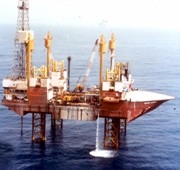 Oil and Natural Gas Corporation, along with state-run Oil India Ltd and Turkish Petroleum Corporation, is likely to bid for Iraq's giant Halfaya oilfield under that country's second licensing round this week.
Oil and Natural Gas Corporation, along with state-run Oil India Ltd and Turkish Petroleum Corporation, is likely to bid for Iraq's giant Halfaya oilfield under that country's second licensing round this week.
Russia's Gazprom or Rosneft may also join ONGC Videsh, the overseas arm of the state-run explorer, in Iraq's second post-war bid round on December 11-12, industry sources said.
Turkish Petroleum will have 50 per cent interest in the consortium, while OVL would hold 30 per cent. OIL would keep the remaining 20 per cent.
In case the Russian firm joins the consortium, the shareholding of TPAO and OVL may be reduced.
Baghdad has put 10 groups of fields on offer in the second tender. Halfaya field has 4.60 billion barrels of reserves with a projected 13-year peak output of 4,00,000 barrels per day (20 million tonnes a year).
The Indians may face competition from French energy major Total SA while Royal Dutch/Shell is believed to have studied the Halfaya field, which would require an investment of $8-10 billion for beginning production, the sources said.
OVL along with OAO Gazprom and TPAO had bid for Zubair oilfield in the first Iraqi licensing round in June but lost it as the remuneration it sought was much higher than $ 1.90-2 a barrel that Baghdad was willing to pay.
Iraq is seeking bids from 45 pre-qualified oil firms on the dollar-per-barrel remuneration fee they want for developing the fields and the targeted plateau production.
While the first post-war Iraqi licensing round in June was focused on increasing output from huge oilfields already in production, the second is about bringing on stream massive undeveloped fields such as Majnoon and West Qurna Phase 2.
As in the first licensing round, all contracts will be technical service contracts, rather than the production sharing contracts favoured by the interested international oil firms. Baghdad is looking at signing 20-year TSCs for the fields, sources said.
The service fee paid to foreign companies will reportedly be higher than in the first bidding round when it was $1.90-2 per barrel, because the fields are undeveloped.
Sources said the scoring formula for the two bidding parameters -- the dollar-per-barrel remuneration fee and plateau production target -- has been weighted 80 per cent toward the fee, with the aim of dissuading companies from promising unrealistically high output targets.
West Qurna-2 and Majnoon may be the most sought after fields and may see bids from the consortiums of Russia's Lukoil and ConocoPhillips, Total of France and Chevron Corp.
The 8.2-billion-barrel Majnoon field, which hugs the border with Iran, may attract big players who will challenge Total, which negotiated for the field alone under Saddam.
State-owned China National Petroleum Corp may also pitch for the bigger West Qurna-2 which holds an estimated 13.5 billion barrels of reserves.
Total may bid against CNPC.
Of the 45 companies that have pre-qualified for the licensing round, 40 firms have paid the $250,000-500,000 participation fees, with the exact sum depending on the field.
Although fraught with risk, many companies are loath to miss out on a rare opportunity to tap easy oil and quadruple Iraqi flows of 2.5 million barrels per day, but will want to tie up negotiations and contracts before elections early next year.
The 10 groups of fields that Baghdad has put on offer in the second tender are: Najmah, Qaiyarah, East Baghdad (Central and North), the Eastern Fields (Gilabat, Khashem Al-Ahmar, Nau Doman, Qumar), Badra, Middle Furat (Kifl, West Kifl, Merjan), Halfaya, Garraf, Majoon and West Qurna phase 2.





